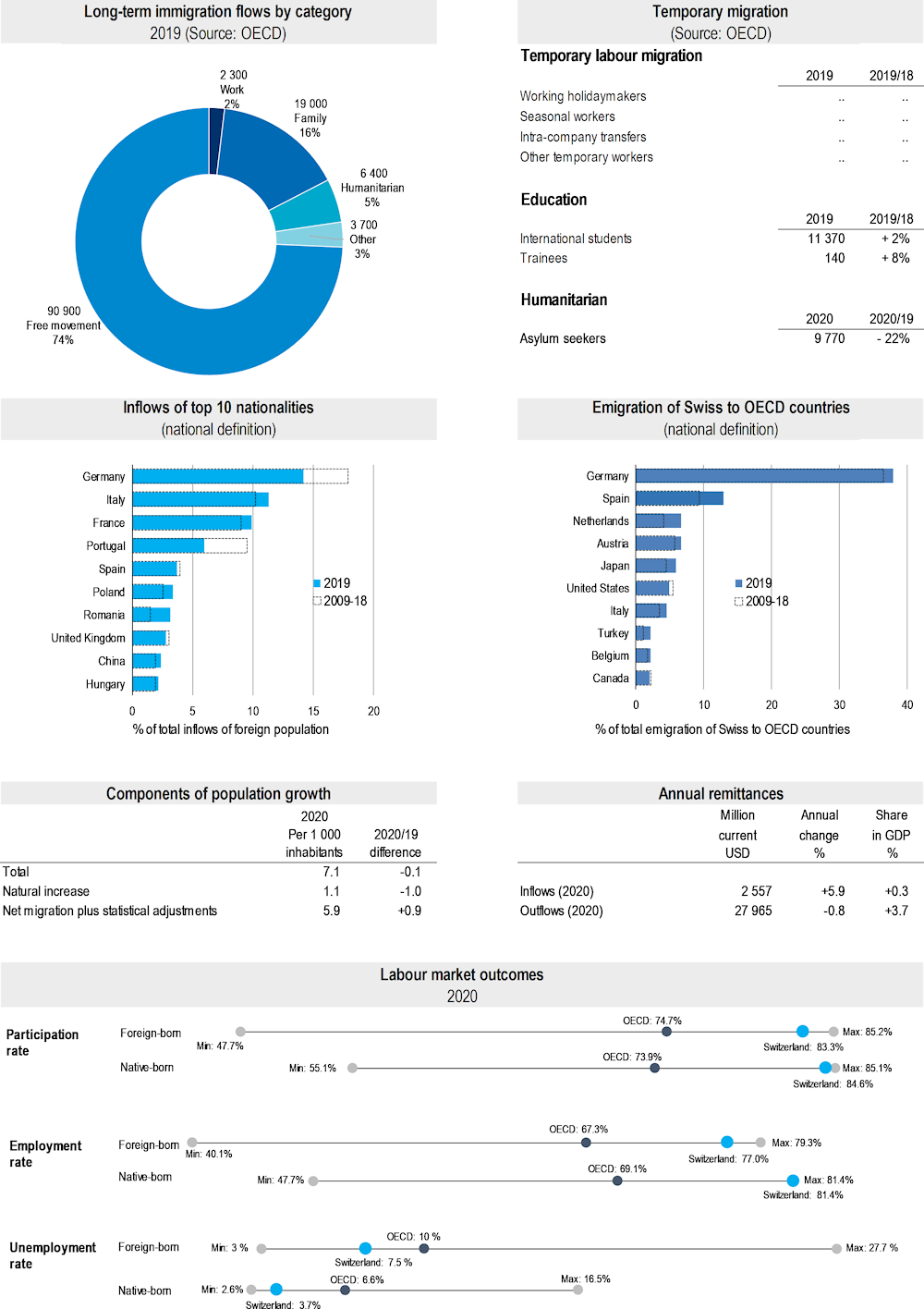In 2019, Switzerland received 122 000 new immigrants on a long-term or permanent basis (including changes of status), 0.2% more than in 2018. This figure comprises 74.3% immigrants benefitting from free mobility, 1.9% labour migrants, 15.5% family members (including accompanying family) and 5.3% humanitarian migrants. Around 11 000 permits were issued to tertiary-level international students and 100 to temporary and seasonal labour migrants.
Germany, Italy and France were the top three nationalities of newcomers in 2019. Among the top 15 countries of origin, Romania registered the strongest increase (2 100) and Italy the largest decrease (‑600) in flows to Switzerland compared to the previous year.
In 2020, the number of first asylum applicants decreased by ‑22.5%, to reach around 9 800. The majority of applicants came from Eritrea (1 600), Afghanistan (1 600) and Turkey (1 100). The largest increase since 2019 concerned nationals of Afghanistan (300) and the largest decrease nationals of Eritrea (‑900). Of the 11 000 decisions taken in 2020, 90.3% were positive.
Emigration of Swiss to OECD countries increased by 3% in 2019, to 9 100. Approximately 26% of this group migrated to Germany, 16% to Spain and 8% to the Netherlands.
To ensure temporarily admitted persons’ integration in the labour market and in society, the Confederation launched in 2019 the Swiss Integration Agenda. In order to reach its objectives, refugees receive, shortly after arrival, language trainings, skills training for those able to enter the labour market, and benefit from targeted information and support on their rights, customs and rules. In 2020, the State Secretariat for Migration (SEM) has notably focused on digitalisation and on the development of visual material to inform refugees on resettlement programmes. The Confederation supports the Cantonal Integration Programmes (PIC), whose next phase will last exceptionally two years, with one‑off integration lump sums, which were increased in 2019 to CHF 18 000 per refugee. During the COVID‑19 pandemic, integration measures in Switzerland continued as much as possible, especially thanks to the possibilities offered by digitalisation.
In the context of the 2019 revision of the Asylum Act, Switzerland has been divided in six asylum regional structures in which the SEM processes asylum applications and accommodates asylum seekers in Federal Centres, where they receive free legal protection for the duration of the procedure. This new configuration has accelerated the asylum process.
To address labour shortages and respond to demand for high-skilled workers, the government decided in 2019 to increase the quotas on work permits delivered to non-EU/EFTA nationals, and left them unchanged in 2020 and 2021. Following the end of the Swiss-UK Agreement on the Free Movement of Persons, separate quotas for UK nationals were introduced for 2021 (1 ‑400 L and 2 100 B permits). Furthermore, the United Kingdom and Switzerland have come to an agreement on services. The agreement secures facilitated market access for service providers from Switzerland and the United Kingdom from 1 January 2021 and is initially limited to two years.
Since January 2020, employers have been required to advertise jobs for occupations where unemployment reaches 5% to people seeking work through Switzerland’s Public Employment Service for five days before others can access the job notification. This measure was initially implemented in July 2018 in sectors with national unemployment rates above 8%. Following the increase in unemployment due to COVID‑19, the job notification requirements have been extended to additional positions, mostly in sales, marketing, services and construction, beginning 1 January 2021.
COVID‑19‑related measures required temporary visa holders to submit an application to obtain a special concession to stay after visa expiry. For third-country nationals who could not leave the Schengen area, the number of days spent in Switzerland after visa expiry will be taken into account for a subsequent stay. In April 2020, the Federal Council took measures to strengthen the protection of persons implicated in asylum procedures, including the extension of the time limits for appealing against an asylum decision and for voluntary departure of rejected asylum seekers, as well as the provision of additional spots in accommodation centres. COVID‑19‑related measures in general concerned mainly entry restrictions.
For further information:

